When I was young, I did not imagine that my name was so “botanical” until when I went to Makerere University and met people of other races. Uganda has 42 indigenous languages! The name Kwikiriza [Kwi,chi rē za] which is common among the Bakiga tribe in South Westeren Uganda, has always been a tongue twister for many. Indeed, that was the case with one of the Decentralized Vine Multipliers (DVMs) in Northern Uganda. As I introduced myself to him, he enquired, “Your name is Quick Results?” This surprised me as I never imagined that there is an English bit of my family name. And for a while I thought, there must be something beautiful in my name. It was not so long until I realized that I was after all dealing in a crop of Kwiki-riza-lts [Quick results].
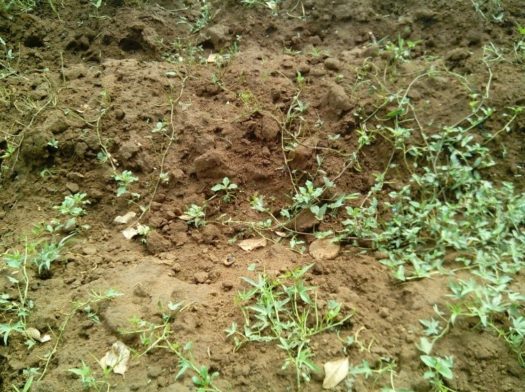
The impression that OFSP is a crop of quick results first appeared as I walked through the numerous OFPS plots of Mr. Unek-Giu in Kitgum-Northern Uganda. Regardless of the many plots he had, he repeatedly expressed that he wanted to plant more vines. Of course, I asked why. My question, seemingly obvious to him, he looked straight to me and whispered, “Vine business has money. He continued to say, “I am a primary teacher but I have found treasure in OFSP vines.” Mr. Unek-Giu was determined to expand his business, despite the fact that barely a month ago, someone intentionally released cattle, which destroyed his quarter acre vine plot. I could understand how “bad” he must have felt, although he chose to forgive the culprit. This is because he was noticeably angry at his own pig which the night before my visit had eaten up the 20 metre-squared rapid multiplication plot around his homestead.
Fast forward: We proceeded to Mr. Lakima’s OFSP plot. What I saw was spectacular! The beautiful scenery that shrouds his plot, the dam at the boundary of his farm, the large expanse of land available for expansion, the completely barbed wired fenced plot, the carefully made heaps, the beautiful label on the plot all exude the mingling of the good natural environment, the effort of CIP and the farmer’s hard work to produce a crop that has become a world wonder.
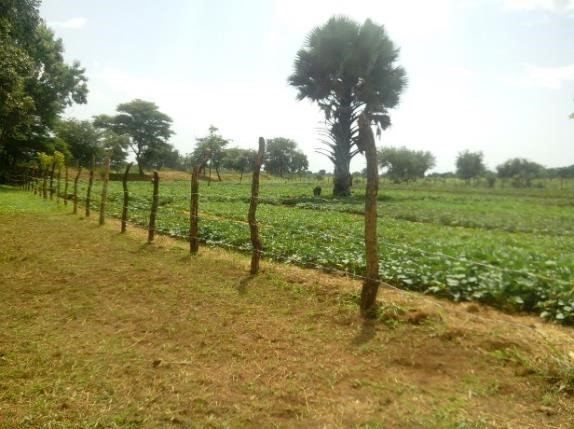
So, I ask him, “when did you become a DVM?” His answer is December 2016. What surprised me is that in just six months, there was a big story to tell about Mr. Lakima’s vine production. The Bakiga have a proverb: “The tongue will never sleep as long as something is in the mouth.” This proverb came alive for this 60-year-old former parish chief, who chose to forego the comfort of the night sleep and the early morning warmth, to guard his plot against cattle and thieves. Until CIP supported him by providing the barbed wire for fencing, he guarded his plot up to 10:00pm and would be back at 5:00am – what an opportunity cost! He was quick to demonstrate to us the fate of any livestock or any thieves of vines that attempted to cross to his plot.
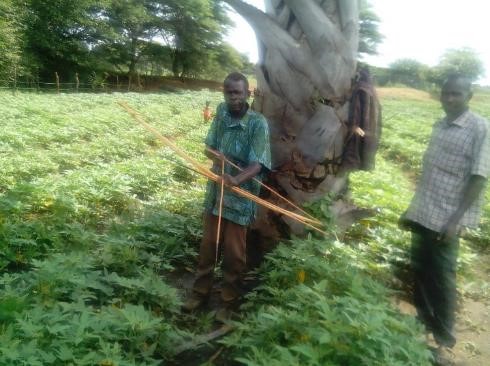
There was so much joy on this farm that a spontaneous dance began! This time I was not a culprit, the dance came from one of the happy souls that had accompanied me to this field. I hastily tried to record the dance. Of course from the little Luo I learnt from my former classmates during my campus days, I could tell that the main words in this Larakaraka dance were – Sweetpotato is good… “Layata Kuri ni be…” please click on this link to watch the recording on youtube https://youtu.be/Qr1e64AjLzg
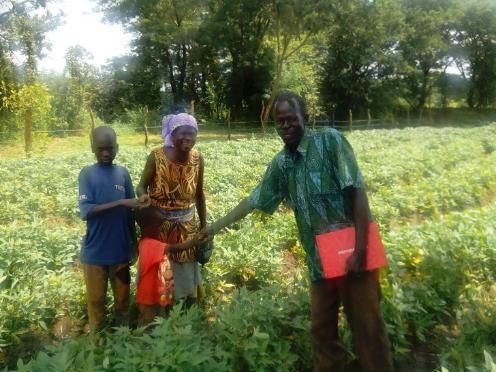
The wife, that was fondly talked of by Mr. Lakima, especially about the wedding they had the very year he became a DVM in 2016 (…talk of Kwiki-riza-lts!), with her frail but determined hands consistently weeded the plots. There also was his son and the grandchild. It appeared to me that vine business would soon turn to be a generational business to the Lakima’s.
The journey to the third farmer, Mr. Lapat, was more dramatic. We snaked through the vast Acholi grasslands. The short showers had made the grass grow so tall that you would not imagine that there could be drought in this area. The OFSP varieties have also found a place of abode
in this environment, where nature seems to say, “the taller you are the better chances to survive drought.
I picked interest and quietly listened to what Mr. Lapat was “saying as he led us to his numerous OFSP plots. I choose to quote some of his statements:
“Ride those vines very fast to Kitgum town because I have got another order.” (We had met his son on a bodaboda transporting them to a waiting farmer in Kitgum town).
“Where are you going? I hope you are not going to drink. We have to plant vines this evening.” (He was telling one of his workers we met coming from his farm).
“Do you see those men, they have to make mounds today. I have to make them like the way Mr. Lakima has made them.” (He was pointing to about 10 men who were taking a lunch rest at his farm).
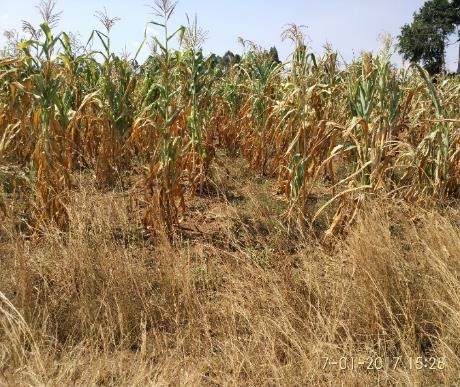
“These moles are dangerous. Because our soils are soft, they can uproot an acre in a few days, especially when vines are young. But I have found a quick remedy for them. You just put cow dung along their way. At the smell of cow dung, they abandon the field.” (He says this while pointing at a recent destruction by the mole rat).
“Monkeys cannot survive in Acholi land. We just kill them.” (He said this when I had asked him if the bushes near his farm may not attract monkeys).
“I get between UGX 100,000-200,000 (US$28- US$ 56) per day from OFSP vine sales. Today, I have got UGX 300,000 from the sale of vines to farmers in Pader.” (Pader is about 120km away from his farm).
“I support about 30 families every day. This is because they provide labour on my farm. Women will come and work for me, and my policy is – if they have children, they can come and eat at my farm in addition to payment. They can eat the OFSP roots for free. Because of this, the community loves me.”
After approximately one hour of walking, we finally reached his OFSP plot. And there I made the final hypothesis proof that OFSP is indeed a crop of quick results. Just like the rest of the DVMs in Kitgum district, Mr. Lapat had recently begun multiplying OFSP vines. Sweetpotato is already the number one source of income for this farmer, replacing Soybean that he has grown for some time. At the farm, women were harvesting vines – and this is a daily activity. My DVM registration interview was constantly interrupted by the many calls he was receiving. To this effect, he tells me, all these callers want vines. He had already told me that I must go with some roots from his farm. He orders the women to harvest some roots, but he then tells me, “These I have given you, it’s a lot of money. In Kitgum town, OFSP roots are on a high demand.”
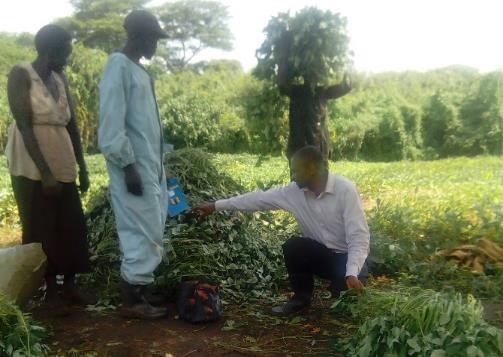
Just close to his farm, there were vines in a lagoon, and I could not see any paths leading to this small and isolated plot of vines. I enquired to know how he crossed to get the vines. He showed me a log of wood that he crosses to reach there. He loves this plot. When everybody has no vines because of drought, he will always have some.
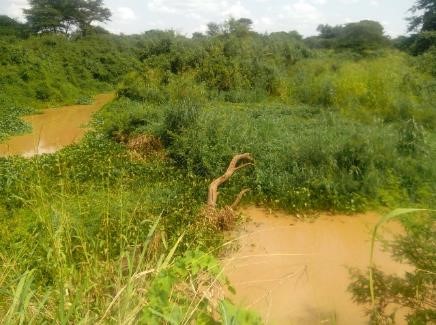
In all these visits, I almost forgot that OFSP is rich in Vitamin A. And if consuming OFSP quickly solves the vitamin A problem the way it has changed the lives of these farmers in Northern Uganda in such a short time, then I must say I am so privileged to work on a crop with such Quick results or Kwiki-riza-lts!
3 Comments. Leave new
Norman this is absolutely brilliant and a very good read. We should strive to demonstrate the Kwi-ki-rizalts from OFSP through such articles which combine science and social perspectives.
Very detailed and catchy story. I am excited to know there are a number of DVMs in Kitgum. Under the current Commercialization component of HarvestPlus and World Vision, we wish to develop over 250 commercial oriented farmers producing orange sweet potatoes for market in Northern Uganda. Like we have done before, will strengthen linkages between the more experienced DVMs like Peter Omondi who has been into OFSP vine production/business since 2012. A strong force will therefore be established in Northern Uganda for consistent production of both roots and vines satisfying the huge market demands at all times.
Big ups Kwik……….Results
Dear Norman,
You are a natural born storyteller. I love the entertaining way in which you have been able to package so much information about the impact that our work is having on DVMs in Northern Uganda. I almost feel like I was there taking walks through the fields with them. Thank you.